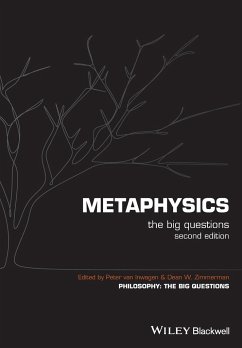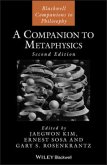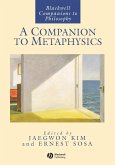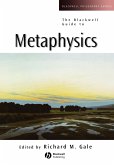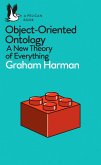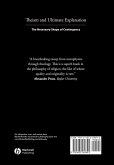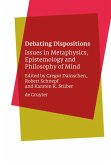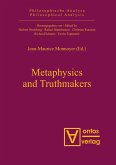ZIMMERMAN DW DEANVAN INWAGEN P PETERThe Big Questions
Metaphysics
The Big Questions
Herausgegeben:van Inwagen, Peter; Zimmerman, Dean W.
ZIMMERMAN DW DEANVAN INWAGEN P PETERThe Big Questions
Metaphysics
The Big Questions
Herausgegeben:van Inwagen, Peter; Zimmerman, Dean W.
- Broschiertes Buch
- Merkliste
- Auf die Merkliste
- Bewerten Bewerten
- Teilen
- Produkt teilen
- Produkterinnerung
- Produkterinnerung
This extensively revised and expanded edition of van Inwagen and Zimmerman's popular collection of classic and contemporary readings in metaphysics now features twenty-two additional selections, and new sections on existence and modality.
The volume poses questions that lead to the deepest issues in traditional metaphysics, including problems about the nature of space and time, the relationship between body and mind, and the freedom of the will. With updated commentary from the editors, this collection is essential reading for those seeking answers to some of the most puzzling questions about the world and our place in it.…mehr
Andere Kunden interessierten sich auch für
![A Companion to Metaphysics A Companion to Metaphysics]() Jaegwon Kim / Ernest Sosa / Gary S. Rosenkrantz (ed.)A Companion to Metaphysics70,99 €
Jaegwon Kim / Ernest Sosa / Gary S. Rosenkrantz (ed.)A Companion to Metaphysics70,99 €![Companion To Metaphysics Companion To Metaphysics]() Companion To Metaphysics71,99 €
Companion To Metaphysics71,99 €![The Blackwell Guide to Metaphysics The Blackwell Guide to Metaphysics]() The Blackwell Guide to Metaphysics58,99 €
The Blackwell Guide to Metaphysics58,99 €![Object-Oriented Ontology Object-Oriented Ontology]() Graham HarmanObject-Oriented Ontology11,99 €
Graham HarmanObject-Oriented Ontology11,99 €![Theism and Ultimate Explanation Theism and Ultimate Explanation]() Timothy O'ConnorTheism and Ultimate Explanation111,99 €
Timothy O'ConnorTheism and Ultimate Explanation111,99 €![Debating Dispositions Debating Dispositions]() Gregor Damschen / Robert Schnepf / Karsten R. Stüber (Hrsg.)Debating Dispositions129,95 €
Gregor Damschen / Robert Schnepf / Karsten R. Stüber (Hrsg.)Debating Dispositions129,95 €![Metaphysics and Truthmakers Metaphysics and Truthmakers]() Metaphysics and Truthmakers129,99 €
Metaphysics and Truthmakers129,99 €-
-
-
This extensively revised and expanded edition of van Inwagen and Zimmerman's popular collection of classic and contemporary readings in metaphysics now features twenty-two additional selections, and new sections on existence and modality.
The volume poses questions that lead to the deepest issues in traditional metaphysics, including problems about the nature of space and time, the relationship between body and mind, and the freedom of the will. With updated commentary from the editors, this collection is essential reading for those seeking answers to some of the most puzzling questions about the world and our place in it.
Hinweis: Dieser Artikel kann nur an eine deutsche Lieferadresse ausgeliefert werden.
The volume poses questions that lead to the deepest issues in traditional metaphysics, including problems about the nature of space and time, the relationship between body and mind, and the freedom of the will. With updated commentary from the editors, this collection is essential reading for those seeking answers to some of the most puzzling questions about the world and our place in it.
Hinweis: Dieser Artikel kann nur an eine deutsche Lieferadresse ausgeliefert werden.
Produktdetails
- Produktdetails
- Philosophy, the Big Questions
- Verlag: Blackwell Publishers
- 2. Aufl.
- Seitenzahl: 656
- Erscheinungstermin: 15. Februar 2008
- Englisch
- Abmessung: 244mm x 170mm x 35mm
- Gewicht: 1125g
- ISBN-13: 9781405125864
- ISBN-10: 1405125861
- Artikelnr.: 20898414
- Herstellerkennzeichnung
- Produktsicherheitsverantwortliche/r
- Europaallee 1
- 36244 Bad Hersfeld
- gpsr@libri.de
- Philosophy, the Big Questions
- Verlag: Blackwell Publishers
- 2. Aufl.
- Seitenzahl: 656
- Erscheinungstermin: 15. Februar 2008
- Englisch
- Abmessung: 244mm x 170mm x 35mm
- Gewicht: 1125g
- ISBN-13: 9781405125864
- ISBN-10: 1405125861
- Artikelnr.: 20898414
- Herstellerkennzeichnung
- Produktsicherheitsverantwortliche/r
- Europaallee 1
- 36244 Bad Hersfeld
- gpsr@libri.de
PETER VAN INWAGEN is John Cardinal O'Hara Professor of Philosophy at the University of Notre Dame. He is the author of The Problem of Evil (2006), Ontology, Identity, and Modality (2001), God, Knowledge, and Mystery: Essays in Philosophical Theology (1995), Metaphysics (1993), Material Beings (1990), and An Essay on Free Will (1983). DEAN W. ZIMMERMAN is Associate Professor of Philosophy at Rutgers University. He has published articles on metaphysics in a number of journals and collections, including The American Philosophical Quarterly, Analysis, The Australasian Journal of Philosophy, Mind, The Monist, Noûs, The Philosophical Review, and Philosophy and Phenomenological Research. He is also editor of the Oxford Studies in Metaphysics series.
Preface to 2nd Edition.
Sources.
Introduction: What is metaphysics?.
Part I: What Are the Most General Features of the World?:.
A. What is existence?.
1. Holes:David Lewis and Stephanie Lewis.
2. On What There Is:W. V. O. Quine.
3. Beyond Being and Nonbeing:Roderick M. Chisholm.
B. What is the relationship between an individual and its characteristics?.
4. Universals: an Excerpt from The Problems of Philosophy:Bertrand Russell.
5. Universals as Attributes:.
An Excerpt from Universals: an Opinionated Introduction,David M. Armstrong.
6. Universals and Resemblances: Chapter 1 of Thinking and Experience H. H.
Price.
7. The Elements of Being:D.C. Williams.
8. The Identity of Indiscernibles:Max Black.
9. Distinct Indiscernibles and the Bundle Theory:Dean W. Zimmerman.
C. What is time? What is space?.
10. Time: an Excerpt from The Nature of Existence:J. McT. E. McTaggart.
11. McTaggart's Arguments against the Reality of Time: an Excerpt from
Examination of McTaggart's Philosophy.
C. D. Broad.
12. The Notion of the Present:A. N. Prior.
13. Changes in Events and Changes in Things:A. N. Prior.
14. The General Problem of Time and Change: an Excerpt from Scientific
Thought:C. D. Broad.
15. The Myth of Passage:D. C. Williams.
16. Some Free Thinking about Time:A. N. Prior.
17. The Fourth Dimension: an Excerpt from The Ambidextrous Universe:Martin
Gardner.
18. Incongruent Counterparts and Higher Dimensions:James Van Cleve.
19. The Traditional Conception of Space, and the Principle of Extensive
Abstraction:.
An Excerpt from Scientific Thought:C. D. Broad.
20. Achilles and the Tortoise: Max Black.
21. A Contemporary Look at Zeno's Paradoxes: an Excerpt from Space, Time,
and Motion.
Wesley C. Salmon.
22. Grasping the Infinite: José A. Benardete.
23. The Paradoxes of Time Travel: David Lewis.
D. How do Things Persist through Changes of Parts and Properties?.
24. Of Confused Subjects Which Are Equivalent to Two Subjects:.
An Excerpt from The Port-Royal Logic:Antoine Arnauld and Pierre Nicole.
25. The Paradox of Increase:Eric T. Olson.
26. Identity, Ostension, and Hypostasis:W. V. O. Quine.
27. In Defense of Stages: Postscript B to "Survival and Identity".
David Lewis.
28. The Problem of Temporary Intrinsics: an Excerpt from On the Plurality
of Worlds.
David Lewis.
29. Temporary Intrinsics and Presentism:Dean W. Zimmerman.
E. How do Causes Bring about their Effects?.
30. Constant Conjunction: an Excerpt from A Treatise of Human Nature.
David Hume.
31. Efficient Cause and Active Power: an Excerpt from Essays on the Active
Powers of the Human Mind.
Thomas Reid.
32. Psychological and Physical Causal Laws: an Excerpt from The Analysis of
Mind.
Bertrand Russell.
33. Causality: an Excerpt from A Modern Introduction to Logic: L. Susan
Stebbing.
34. Causality and Determination: G. E. M. Anscombe.
Part II: What Is Our Place in the World?:.
A. How Are Mind and Body Related?.
35. Which Physical Thing Am I?: an Excerpt from "Is There a Mind-Body
Problem?".
Roderick M. Chisholm.
36. Personal Identity: a Materialist Account: Sydney Shoemaker.
37. An Argument for Animalism: Eric T. Olson.
38. Divided Minds and the Nature of Persons: Derek Parfit.
39. Personal Identity: the Dualist Theory: Richard Swinburne.
40. The Causal Theory of the Mind: David M. Armstrong.
41. The Puzzle of Conscious Experience: David J. Chalmers.
42. Neutral Monism: an Excerpt from Philosophy: Bertrand Russell.
B. Is it Possible for Us to Act Freely?.
43. We Are Never Free: an Excerpt from The System of Nature.
Paul-Henri Dietrich, Baron d'Holbach.
44. Free Will as Involving Determination and Inconceivable without It.
R. E. Hobart.
45. Freedom, Causation, and Preexistence: an Excerpt from Problems of Mind
and Matter.
John Wisdom.
46. Human Freedom and the Self: Roderick M. Chisholm.
47. The Consequence Argument: Peter van Inwagen.
48. The Mystery of Metaphysical Freedom: Peter van Inwagen.
49. The Agent as Cause: Timothy O'Connor.
50. Alternate Possibilities and Moral Responsibility: Harry G. Frankfurt.
51. Freedom of the Will and the Concept of a Person: Harry G. Frankfurt.
Part III: Are There Many Worlds?:.
A. Are There Worlds Other than the Actual World?.
52. Modal Realism at Work: an Excerpt from On the Plurality of Worlds.
David Lewis.
53. Counterparts of Persons and Their Bodies: David Lewis.
54. Identity and Necessity: Saul Kripke.
B. Is There More than One Actual World?.
55. After Metaphysics, What?: Hilary Putnam.
56. Truth and Convention: Hilary Putnam.
57. Nonabsolute Existence and Conceptual Relativity: an Excerpt from
"Putnam's Pragmatic Realism".
Ernest Sosa.
58. Addendum to "Nonabsolute Existence and Conceptual Relativity":
Objections and Replies.
Ernest Sosa.
Part IV: Why Is There a World?:.
59. The Problem of Being: Chapter 3 of Some Problems of Philosophy: William
James.
60. Why Anything? Why This?: Derek Parfit.
61. Response to Derek Parfit: Richard Swinburne.
62. The Cosmological Argument: an Excerpt from A Demonstration of the Being
and Attributes of God.
Samuel Clarke.
63. The Cosmological Argument and the Principle of Sufficient Reason:
William L. Rowe.
64. The Ontological Argument: Chapters II-IV of the Proslogion: St Anselm.
65. Anselm's Ontological Arguments: Norman Malcolm.
Index
Sources.
Introduction: What is metaphysics?.
Part I: What Are the Most General Features of the World?:.
A. What is existence?.
1. Holes:David Lewis and Stephanie Lewis.
2. On What There Is:W. V. O. Quine.
3. Beyond Being and Nonbeing:Roderick M. Chisholm.
B. What is the relationship between an individual and its characteristics?.
4. Universals: an Excerpt from The Problems of Philosophy:Bertrand Russell.
5. Universals as Attributes:.
An Excerpt from Universals: an Opinionated Introduction,David M. Armstrong.
6. Universals and Resemblances: Chapter 1 of Thinking and Experience H. H.
Price.
7. The Elements of Being:D.C. Williams.
8. The Identity of Indiscernibles:Max Black.
9. Distinct Indiscernibles and the Bundle Theory:Dean W. Zimmerman.
C. What is time? What is space?.
10. Time: an Excerpt from The Nature of Existence:J. McT. E. McTaggart.
11. McTaggart's Arguments against the Reality of Time: an Excerpt from
Examination of McTaggart's Philosophy.
C. D. Broad.
12. The Notion of the Present:A. N. Prior.
13. Changes in Events and Changes in Things:A. N. Prior.
14. The General Problem of Time and Change: an Excerpt from Scientific
Thought:C. D. Broad.
15. The Myth of Passage:D. C. Williams.
16. Some Free Thinking about Time:A. N. Prior.
17. The Fourth Dimension: an Excerpt from The Ambidextrous Universe:Martin
Gardner.
18. Incongruent Counterparts and Higher Dimensions:James Van Cleve.
19. The Traditional Conception of Space, and the Principle of Extensive
Abstraction:.
An Excerpt from Scientific Thought:C. D. Broad.
20. Achilles and the Tortoise: Max Black.
21. A Contemporary Look at Zeno's Paradoxes: an Excerpt from Space, Time,
and Motion.
Wesley C. Salmon.
22. Grasping the Infinite: José A. Benardete.
23. The Paradoxes of Time Travel: David Lewis.
D. How do Things Persist through Changes of Parts and Properties?.
24. Of Confused Subjects Which Are Equivalent to Two Subjects:.
An Excerpt from The Port-Royal Logic:Antoine Arnauld and Pierre Nicole.
25. The Paradox of Increase:Eric T. Olson.
26. Identity, Ostension, and Hypostasis:W. V. O. Quine.
27. In Defense of Stages: Postscript B to "Survival and Identity".
David Lewis.
28. The Problem of Temporary Intrinsics: an Excerpt from On the Plurality
of Worlds.
David Lewis.
29. Temporary Intrinsics and Presentism:Dean W. Zimmerman.
E. How do Causes Bring about their Effects?.
30. Constant Conjunction: an Excerpt from A Treatise of Human Nature.
David Hume.
31. Efficient Cause and Active Power: an Excerpt from Essays on the Active
Powers of the Human Mind.
Thomas Reid.
32. Psychological and Physical Causal Laws: an Excerpt from The Analysis of
Mind.
Bertrand Russell.
33. Causality: an Excerpt from A Modern Introduction to Logic: L. Susan
Stebbing.
34. Causality and Determination: G. E. M. Anscombe.
Part II: What Is Our Place in the World?:.
A. How Are Mind and Body Related?.
35. Which Physical Thing Am I?: an Excerpt from "Is There a Mind-Body
Problem?".
Roderick M. Chisholm.
36. Personal Identity: a Materialist Account: Sydney Shoemaker.
37. An Argument for Animalism: Eric T. Olson.
38. Divided Minds and the Nature of Persons: Derek Parfit.
39. Personal Identity: the Dualist Theory: Richard Swinburne.
40. The Causal Theory of the Mind: David M. Armstrong.
41. The Puzzle of Conscious Experience: David J. Chalmers.
42. Neutral Monism: an Excerpt from Philosophy: Bertrand Russell.
B. Is it Possible for Us to Act Freely?.
43. We Are Never Free: an Excerpt from The System of Nature.
Paul-Henri Dietrich, Baron d'Holbach.
44. Free Will as Involving Determination and Inconceivable without It.
R. E. Hobart.
45. Freedom, Causation, and Preexistence: an Excerpt from Problems of Mind
and Matter.
John Wisdom.
46. Human Freedom and the Self: Roderick M. Chisholm.
47. The Consequence Argument: Peter van Inwagen.
48. The Mystery of Metaphysical Freedom: Peter van Inwagen.
49. The Agent as Cause: Timothy O'Connor.
50. Alternate Possibilities and Moral Responsibility: Harry G. Frankfurt.
51. Freedom of the Will and the Concept of a Person: Harry G. Frankfurt.
Part III: Are There Many Worlds?:.
A. Are There Worlds Other than the Actual World?.
52. Modal Realism at Work: an Excerpt from On the Plurality of Worlds.
David Lewis.
53. Counterparts of Persons and Their Bodies: David Lewis.
54. Identity and Necessity: Saul Kripke.
B. Is There More than One Actual World?.
55. After Metaphysics, What?: Hilary Putnam.
56. Truth and Convention: Hilary Putnam.
57. Nonabsolute Existence and Conceptual Relativity: an Excerpt from
"Putnam's Pragmatic Realism".
Ernest Sosa.
58. Addendum to "Nonabsolute Existence and Conceptual Relativity":
Objections and Replies.
Ernest Sosa.
Part IV: Why Is There a World?:.
59. The Problem of Being: Chapter 3 of Some Problems of Philosophy: William
James.
60. Why Anything? Why This?: Derek Parfit.
61. Response to Derek Parfit: Richard Swinburne.
62. The Cosmological Argument: an Excerpt from A Demonstration of the Being
and Attributes of God.
Samuel Clarke.
63. The Cosmological Argument and the Principle of Sufficient Reason:
William L. Rowe.
64. The Ontological Argument: Chapters II-IV of the Proslogion: St Anselm.
65. Anselm's Ontological Arguments: Norman Malcolm.
Index
Preface to 2nd Edition.
Sources.
Introduction: What is metaphysics?.
Part I: What Are the Most General Features of the World?:.
A. What is existence?.
1. Holes:David Lewis and Stephanie Lewis.
2. On What There Is:W. V. O. Quine.
3. Beyond Being and Nonbeing:Roderick M. Chisholm.
B. What is the relationship between an individual and its characteristics?.
4. Universals: an Excerpt from The Problems of Philosophy:Bertrand Russell.
5. Universals as Attributes:.
An Excerpt from Universals: an Opinionated Introduction,David M. Armstrong.
6. Universals and Resemblances: Chapter 1 of Thinking and Experience H. H.
Price.
7. The Elements of Being:D.C. Williams.
8. The Identity of Indiscernibles:Max Black.
9. Distinct Indiscernibles and the Bundle Theory:Dean W. Zimmerman.
C. What is time? What is space?.
10. Time: an Excerpt from The Nature of Existence:J. McT. E. McTaggart.
11. McTaggart's Arguments against the Reality of Time: an Excerpt from
Examination of McTaggart's Philosophy.
C. D. Broad.
12. The Notion of the Present:A. N. Prior.
13. Changes in Events and Changes in Things:A. N. Prior.
14. The General Problem of Time and Change: an Excerpt from Scientific
Thought:C. D. Broad.
15. The Myth of Passage:D. C. Williams.
16. Some Free Thinking about Time:A. N. Prior.
17. The Fourth Dimension: an Excerpt from The Ambidextrous Universe:Martin
Gardner.
18. Incongruent Counterparts and Higher Dimensions:James Van Cleve.
19. The Traditional Conception of Space, and the Principle of Extensive
Abstraction:.
An Excerpt from Scientific Thought:C. D. Broad.
20. Achilles and the Tortoise: Max Black.
21. A Contemporary Look at Zeno's Paradoxes: an Excerpt from Space, Time,
and Motion.
Wesley C. Salmon.
22. Grasping the Infinite: José A. Benardete.
23. The Paradoxes of Time Travel: David Lewis.
D. How do Things Persist through Changes of Parts and Properties?.
24. Of Confused Subjects Which Are Equivalent to Two Subjects:.
An Excerpt from The Port-Royal Logic:Antoine Arnauld and Pierre Nicole.
25. The Paradox of Increase:Eric T. Olson.
26. Identity, Ostension, and Hypostasis:W. V. O. Quine.
27. In Defense of Stages: Postscript B to "Survival and Identity".
David Lewis.
28. The Problem of Temporary Intrinsics: an Excerpt from On the Plurality
of Worlds.
David Lewis.
29. Temporary Intrinsics and Presentism:Dean W. Zimmerman.
E. How do Causes Bring about their Effects?.
30. Constant Conjunction: an Excerpt from A Treatise of Human Nature.
David Hume.
31. Efficient Cause and Active Power: an Excerpt from Essays on the Active
Powers of the Human Mind.
Thomas Reid.
32. Psychological and Physical Causal Laws: an Excerpt from The Analysis of
Mind.
Bertrand Russell.
33. Causality: an Excerpt from A Modern Introduction to Logic: L. Susan
Stebbing.
34. Causality and Determination: G. E. M. Anscombe.
Part II: What Is Our Place in the World?:.
A. How Are Mind and Body Related?.
35. Which Physical Thing Am I?: an Excerpt from "Is There a Mind-Body
Problem?".
Roderick M. Chisholm.
36. Personal Identity: a Materialist Account: Sydney Shoemaker.
37. An Argument for Animalism: Eric T. Olson.
38. Divided Minds and the Nature of Persons: Derek Parfit.
39. Personal Identity: the Dualist Theory: Richard Swinburne.
40. The Causal Theory of the Mind: David M. Armstrong.
41. The Puzzle of Conscious Experience: David J. Chalmers.
42. Neutral Monism: an Excerpt from Philosophy: Bertrand Russell.
B. Is it Possible for Us to Act Freely?.
43. We Are Never Free: an Excerpt from The System of Nature.
Paul-Henri Dietrich, Baron d'Holbach.
44. Free Will as Involving Determination and Inconceivable without It.
R. E. Hobart.
45. Freedom, Causation, and Preexistence: an Excerpt from Problems of Mind
and Matter.
John Wisdom.
46. Human Freedom and the Self: Roderick M. Chisholm.
47. The Consequence Argument: Peter van Inwagen.
48. The Mystery of Metaphysical Freedom: Peter van Inwagen.
49. The Agent as Cause: Timothy O'Connor.
50. Alternate Possibilities and Moral Responsibility: Harry G. Frankfurt.
51. Freedom of the Will and the Concept of a Person: Harry G. Frankfurt.
Part III: Are There Many Worlds?:.
A. Are There Worlds Other than the Actual World?.
52. Modal Realism at Work: an Excerpt from On the Plurality of Worlds.
David Lewis.
53. Counterparts of Persons and Their Bodies: David Lewis.
54. Identity and Necessity: Saul Kripke.
B. Is There More than One Actual World?.
55. After Metaphysics, What?: Hilary Putnam.
56. Truth and Convention: Hilary Putnam.
57. Nonabsolute Existence and Conceptual Relativity: an Excerpt from
"Putnam's Pragmatic Realism".
Ernest Sosa.
58. Addendum to "Nonabsolute Existence and Conceptual Relativity":
Objections and Replies.
Ernest Sosa.
Part IV: Why Is There a World?:.
59. The Problem of Being: Chapter 3 of Some Problems of Philosophy: William
James.
60. Why Anything? Why This?: Derek Parfit.
61. Response to Derek Parfit: Richard Swinburne.
62. The Cosmological Argument: an Excerpt from A Demonstration of the Being
and Attributes of God.
Samuel Clarke.
63. The Cosmological Argument and the Principle of Sufficient Reason:
William L. Rowe.
64. The Ontological Argument: Chapters II-IV of the Proslogion: St Anselm.
65. Anselm's Ontological Arguments: Norman Malcolm.
Index
Sources.
Introduction: What is metaphysics?.
Part I: What Are the Most General Features of the World?:.
A. What is existence?.
1. Holes:David Lewis and Stephanie Lewis.
2. On What There Is:W. V. O. Quine.
3. Beyond Being and Nonbeing:Roderick M. Chisholm.
B. What is the relationship between an individual and its characteristics?.
4. Universals: an Excerpt from The Problems of Philosophy:Bertrand Russell.
5. Universals as Attributes:.
An Excerpt from Universals: an Opinionated Introduction,David M. Armstrong.
6. Universals and Resemblances: Chapter 1 of Thinking and Experience H. H.
Price.
7. The Elements of Being:D.C. Williams.
8. The Identity of Indiscernibles:Max Black.
9. Distinct Indiscernibles and the Bundle Theory:Dean W. Zimmerman.
C. What is time? What is space?.
10. Time: an Excerpt from The Nature of Existence:J. McT. E. McTaggart.
11. McTaggart's Arguments against the Reality of Time: an Excerpt from
Examination of McTaggart's Philosophy.
C. D. Broad.
12. The Notion of the Present:A. N. Prior.
13. Changes in Events and Changes in Things:A. N. Prior.
14. The General Problem of Time and Change: an Excerpt from Scientific
Thought:C. D. Broad.
15. The Myth of Passage:D. C. Williams.
16. Some Free Thinking about Time:A. N. Prior.
17. The Fourth Dimension: an Excerpt from The Ambidextrous Universe:Martin
Gardner.
18. Incongruent Counterparts and Higher Dimensions:James Van Cleve.
19. The Traditional Conception of Space, and the Principle of Extensive
Abstraction:.
An Excerpt from Scientific Thought:C. D. Broad.
20. Achilles and the Tortoise: Max Black.
21. A Contemporary Look at Zeno's Paradoxes: an Excerpt from Space, Time,
and Motion.
Wesley C. Salmon.
22. Grasping the Infinite: José A. Benardete.
23. The Paradoxes of Time Travel: David Lewis.
D. How do Things Persist through Changes of Parts and Properties?.
24. Of Confused Subjects Which Are Equivalent to Two Subjects:.
An Excerpt from The Port-Royal Logic:Antoine Arnauld and Pierre Nicole.
25. The Paradox of Increase:Eric T. Olson.
26. Identity, Ostension, and Hypostasis:W. V. O. Quine.
27. In Defense of Stages: Postscript B to "Survival and Identity".
David Lewis.
28. The Problem of Temporary Intrinsics: an Excerpt from On the Plurality
of Worlds.
David Lewis.
29. Temporary Intrinsics and Presentism:Dean W. Zimmerman.
E. How do Causes Bring about their Effects?.
30. Constant Conjunction: an Excerpt from A Treatise of Human Nature.
David Hume.
31. Efficient Cause and Active Power: an Excerpt from Essays on the Active
Powers of the Human Mind.
Thomas Reid.
32. Psychological and Physical Causal Laws: an Excerpt from The Analysis of
Mind.
Bertrand Russell.
33. Causality: an Excerpt from A Modern Introduction to Logic: L. Susan
Stebbing.
34. Causality and Determination: G. E. M. Anscombe.
Part II: What Is Our Place in the World?:.
A. How Are Mind and Body Related?.
35. Which Physical Thing Am I?: an Excerpt from "Is There a Mind-Body
Problem?".
Roderick M. Chisholm.
36. Personal Identity: a Materialist Account: Sydney Shoemaker.
37. An Argument for Animalism: Eric T. Olson.
38. Divided Minds and the Nature of Persons: Derek Parfit.
39. Personal Identity: the Dualist Theory: Richard Swinburne.
40. The Causal Theory of the Mind: David M. Armstrong.
41. The Puzzle of Conscious Experience: David J. Chalmers.
42. Neutral Monism: an Excerpt from Philosophy: Bertrand Russell.
B. Is it Possible for Us to Act Freely?.
43. We Are Never Free: an Excerpt from The System of Nature.
Paul-Henri Dietrich, Baron d'Holbach.
44. Free Will as Involving Determination and Inconceivable without It.
R. E. Hobart.
45. Freedom, Causation, and Preexistence: an Excerpt from Problems of Mind
and Matter.
John Wisdom.
46. Human Freedom and the Self: Roderick M. Chisholm.
47. The Consequence Argument: Peter van Inwagen.
48. The Mystery of Metaphysical Freedom: Peter van Inwagen.
49. The Agent as Cause: Timothy O'Connor.
50. Alternate Possibilities and Moral Responsibility: Harry G. Frankfurt.
51. Freedom of the Will and the Concept of a Person: Harry G. Frankfurt.
Part III: Are There Many Worlds?:.
A. Are There Worlds Other than the Actual World?.
52. Modal Realism at Work: an Excerpt from On the Plurality of Worlds.
David Lewis.
53. Counterparts of Persons and Their Bodies: David Lewis.
54. Identity and Necessity: Saul Kripke.
B. Is There More than One Actual World?.
55. After Metaphysics, What?: Hilary Putnam.
56. Truth and Convention: Hilary Putnam.
57. Nonabsolute Existence and Conceptual Relativity: an Excerpt from
"Putnam's Pragmatic Realism".
Ernest Sosa.
58. Addendum to "Nonabsolute Existence and Conceptual Relativity":
Objections and Replies.
Ernest Sosa.
Part IV: Why Is There a World?:.
59. The Problem of Being: Chapter 3 of Some Problems of Philosophy: William
James.
60. Why Anything? Why This?: Derek Parfit.
61. Response to Derek Parfit: Richard Swinburne.
62. The Cosmological Argument: an Excerpt from A Demonstration of the Being
and Attributes of God.
Samuel Clarke.
63. The Cosmological Argument and the Principle of Sufficient Reason:
William L. Rowe.
64. The Ontological Argument: Chapters II-IV of the Proslogion: St Anselm.
65. Anselm's Ontological Arguments: Norman Malcolm.
Index

